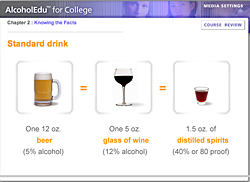

UDaily is produced by the Office of Public Relations
The Academy Building,
105 East Main St.
Newark, DE 19716-2701
(302) 831-2791
|
 |
AlcoholEdu teaches new students the facts about drinking
 |
| Research shows that students do not know how much alcohol is in one drink. AlcoholEdu for College educates students about a “standard drink,” or the specific amount of beer, wine or liquor that contains the same total amount of alcohol. This knowledge helps students better understand concepts like blood alcohol concentration (BAC). |
5:31 p.m., March 19, 2007--Since the 1990s, the University of Delaware has used a multi-pronged approach to encourage students to become aware of the social, academic and health consequences of irresponsible and binge drinking and to make informed decisions about alcohol.
Most recently, AlcoholEdu, an online, informative, factual course on alcohol that students can take in their own rooms at their convenience, was required for the first time for incoming freshmen last fall and for both new freshmen and transfer students this spring.
Offered at more than 450 college and university campuses with more than 250,000 students participating, AlcoholEd educates students about the facts of alcohol, encourages students to change their behavior regarding alcohol and decrease the negative consequences of alcohol in their personal and academic lives.
 |
| Tracy Downs, program coordinator at Wellspring, UD’s Student Wellness Program: “After completing the course, UD freshmen are more knowledgeable, express concern about friends’ drinking, and those who do drink are more aware of the effects and consequences of alcohol and consider changing behaviors.” |
Through three surveys administered during the course, AlcoholEdu also provides schools with data on student attitudes and alcohol-related issues.
The results of the AlcoholEdu course are encouraging and speak for themselves, according to Tracy Downs, program coordinator at Wellspring, UD's Student Wellness Program.
“Although drinking continues to be a concern on most campuses, AlcoholEdu sends a strong message and is an effective tool to educate students about the effects of alcohol,” she said. “After completing the course, UD freshmen are more knowledgeable, express concern about friends' drinking, and those who do drink are more aware of the effects and consequences of alcohol and consider changing behaviors.”
During the fall semester, 3,643 UD freshmen completed the first survey, and 98 percent completed the entire course, an exam and three surveys. (Freshmen under the age of 18 did not receive the surveys.)
Some of the findings for UD freshmen who completed the third survey were:
- 88 percent paid attention to the course, and 75 percent found it helpful;
- 70 percent, up from 43 percent before taking the course, knew more than a “moderate amount” about the effects of alcohol after taking the exam;
- 71 percent said they learned more about blood alcohol concentration (BAC);
- 63 percent thought about their BAC while drinking, an important factor in moderating alcohol consumption;
- 43 percent reported caring for a friend who had been drinking, 49 expressed their concern to a friend who was drinking too much, and 61 percent worried about a friend drinking too much;
- 47 percent reported knowing more about the ways alcohol affects a person's ability to give consent for sex:
- 28 percent, up from 17 percent before taking the course, of those who do drink developed awareness of the need to change the way they drink in healthier and safer ways; and
- Overall, UD students reported a higher rate of abstinence and a lower rate of heavy-episodic drinking as the semester progressed.
 |
| Catherine Skelley, assistant director of residence life: ““The number of alcohol-policy violations and medical transports for alcohol overdoses for the year-to-date both have declined from the previous year.” |
“AlcoholEdu ensures that all new students are getting the same information about alcohol and students are aware of this as well,” Catherine Skelley, assistant director of residence life, said. “It is a starting point for discussions in residence halls and for students to make decisions about alcohol and responsible drinking.
“The number of alcohol-policy violations and medical transports for alcohol overdoses for the year-to-date both have declined from the previous year. We hope this progress will continue, and it will be interesting to see what statistics show in four or five years when the entire student body has taken AlcoholEdu,” Skelley said.
Article by Sue Moncure
Photos by Kathy Atkinson
 E-mail this article E-mail this article
 Subscribe to UDaily Subscribe to UDaily
 Subscribe to crime alert e-mail notification Subscribe to crime alert e-mail notification
|
 |

|

